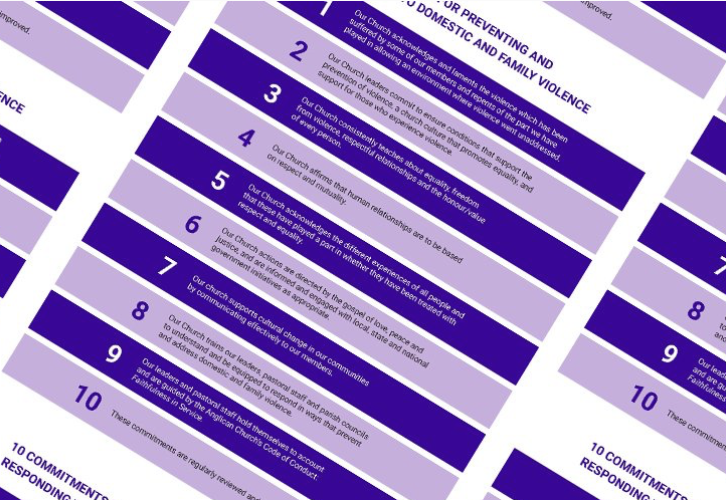This week’s Faith Hope and Love conference confronting domestic violence, organised by the Anglican Church’s Families and Culture Commission and Common Grace, was just about wrapped up when a voice from the Northern Territory said they had something special to offer. It was a Plain English version of the Ten Commitments For Prevention and Responding to Domestic and Family Violence, already endorsed by most of the Anglican Church of Australia’s dioceses (regions).
The ten commitments came out of the Anglican Church’s research into family violence in 2019, which found that among those surveyed, the rate of family violence in our faith community was the same or higher than the rate in the general community.
“In answer to the direct question ‘have you been in a violent relationship with any partner?’ approximately 23% of Anglicans who had been in an intimate adlult relationship said ‘yes.'” the intoduction to the ten commitments document reorts. “(This compared to 15% for the equivelent group of the general Australian public in the same survey.”
The commitments seek a change in attitude rather than simply a change in church rules. “Rather than then legislating – we say we are not regulators we are encouragers,” Bishop Genieve Blackwell of Melbourne told the Faith Hope and Love conference this week.
The plain language came from a decision by the Anglicans of the Northern Territory to make sure the churches’ commitments to end violence were accessible to everyone. And The Other Cheek is pleased to pass them on.
- The Anglican Church talks about how some people who belong to our church have been hurt by family violence. We feel very sad about that. We feel sorry that sometimes we didn’t do anything to stop that violence. But now we want to help stop family violence.
- Our church leaders will work hard to stop that violence from happening. In our church we want everyone, men and women, to be equal. If family violence happens to you, we want to help you.
- The Anglican Church always teaches that no one is better than anyone else. We are all equal, so we have to show respect to everyone. We teach that no one should use violence against another person.
- Our church teaches that everyone should be good to each other. We must respect other people, and other people should respect us.
- Our church mob is made up of lots of different people. There are people with different ages, different genders, and different skin colours. Family violence can be worse for some people than for others. We want to work hard to make sure everyone is equal.
- Everything our church does is for Jesus. We want to love others, live at peace, and be fair to everyone. We also want to know about government groups, maybe in community or maybe in the Northern Territory, and work with them to stop family violence.
- We want everybody in our church to think the right way about these things, so we will work hard to teach everybody about how to look after each other.
- Our church will teach our ministers, leaders and parish councils so that they will know more about family violence, and know how to help people. We will teach them about how to try to stop family violence from happening.
- Our ministers and leaders have to make sure they are behaving the right way. There’s a church booklet about the right way for church leaders to behave. It’s called the Anglican Church’s Code of Conduct: Faithfulness in Service. They can read that booklet to make sure they are doing the right things.
- Our church will keep looking at these ideas again. We will see if they are working. Maybe we can make them even better.
The original ten commitments are found here.
The ten commitments come with strategies to help bring about a new reality with no violence.
For example, Commitment 4 (in original language) reads, “Our Church affirms that human relationships will be based on respect and mutuality.” Clergy are urged to incorporate that in their teaching, and one strategy is “Clergy and other pastoral staff ensure that marriage preparation, enrichment and other educational material about relationship display awareness of power and control issues.”
Commitment 6 reads, “Our Church actions are directed by the gospel of love, peace and justice and are informed and engaged with local, state, and national government initiatives as appropriate.” The nature of church cooperation is considered controversial by some Christians, so this robust commitment certainly stands out.
Suggested strategies include “Parishes and other church agancies form active partnerships (including referal relationships) with local domestic and family violence services.” And “Relevent diocesan and national church officers are engaged wuth national sate and national processes to prevent and respond to sdomestic and family violence, e.g. through representation on relevevant committes or by attendance at conferences,.”
The idea of closely partnering with government and secular agencies will be more challenging for some Christians and seem an obvious and simple steps for some others.
It was striking that the Faith Hope and Love Conference drew a wide range of Christians from conservative and progressive parts of Anglicanism and other denominations (Salvation Army to Catholic. Pentecostal to Reformed Presbyterian) and secular experts as well. There was an atmosphere of respect rather than competition among the extremely broad gathering. Keynote addresses by Michael Flood from QUT a recognised expert on partner violence and masculinities, Clinical Psychologist Leisa Aitken on hope, Common Grace’s Safina Stewart, a Wuthithi and Mabuiag Island woman and a survivor/victim herself, the Univerity of Divinity’s Robyn Whitaker on amplifying women’s voices in the Bible, and Alexander Dentener of Jesuit Social Services’ Men’s Project.
The Other Cheek will have seperate follow-up reports of many of these presentations.

